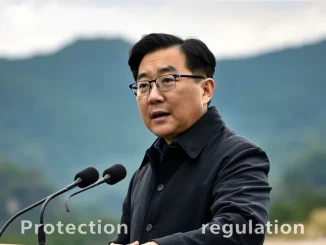
In a significant move for the cryptocurrency landscape, South Korea is doubling down on its commitment to regulate stablecoins. Despite the inherent volatility often associated with the crypto market, the Financial Services Commission (FSC) in South Korea is determined to forge ahead with its plans to draft comprehensive stablecoin regulation. This steadfast approach signals a maturing phase for the digital asset space in the nation, prioritizing user protection and market stability. Let’s dive into what this means for the future of crypto in South Korea.
South Korea’s Decisive Stance on Stablecoin Regulation
The South Korean government has made it abundantly clear: regulating stablecoins is not just an option, but a priority. This commitment was initially highlighted when authorities announced a legislative review for the second phase of their virtual asset framework. Now, the FSC has unequivocally reaffirmed its dedication to this timeline, ensuring the development of a robust stablecoin regulation framework proceeds smoothly and according to schedule.
Here’s a breakdown of what we know:
- Unwavering Commitment: The FSC is sticking to its original plan to draft the specifics of the second phase of regulations in the latter half of this year.
- Dedicated Task Force: To spearhead this complex undertaking, a specialized task force will be assembled, comprising experts from various relevant government agencies. This collaborative approach underscores the importance and multi-faceted nature of crypto regulation.
- Proactive Timeline: Despite market fluctuations and global economic shifts, South Korea is not wavering. The planned timeline remains intact, demonstrating a proactive and decisive regulatory stance.
Why is Stablecoin Regulation a Top Priority for South Korea?
The urgency behind regulating stablecoins stems from their unique position within the virtual assets ecosystem. Unlike more volatile cryptocurrencies, stablecoins are designed to maintain a stable value, often pegged to fiat currencies like the US dollar or other assets. This stability makes them crucial for trading, lending, and various decentralized finance (DeFi) applications. However, this perceived stability also carries risks if not properly managed and regulated.
Consider these key reasons for South Korea‘s focus on stablecoin regulation:
- Market Volatility Concerns: Recent spikes in market volatility across the crypto sphere have amplified concerns about investor protection and systemic risks. Stablecoins, while designed for stability, can still be vulnerable, as demonstrated by past events in the crypto market.
- Investor Protection: A primary driver for crypto regulation globally is safeguarding investors. Without clear rules, users of stablecoins could be exposed to risks related to reserves, issuance practices, and redemption mechanisms.
- Broader Virtual Asset Framework: Regulating stablecoins is a critical component of South Korea‘s larger virtual assets framework. It’s not an isolated effort but an integral part of creating a comprehensive and secure digital asset ecosystem.
- Global Regulatory Alignment: Many jurisdictions worldwide are grappling with how to regulate stablecoins. South Korea‘s proactive approach positions it as a forward-thinking nation in the global regulatory landscape for virtual assets.
Enhanced Market Monitoring: A Shield for Crypto Users
Beyond drafting new regulations, the FSC has also emphasized strengthening the monitoring of the broader virtual assets market, with a keen eye on stablecoins. This enhanced surveillance is a direct response to the increased market volatility and is geared towards bolstering protections for crypto users.
What does this enhanced monitoring entail?
- Proactive Surveillance: The FSC will be actively monitoring market trends, trading volumes, and potential risks within the virtual assets space, particularly concerning stablecoins.
- Early Risk Detection: The goal is to identify and address potential risks early on, preventing larger market disruptions and protecting users from significant losses.
- Data-Driven Approach: By strengthening monitoring, regulators can gather more data and insights into the stablecoin market, informing the development of more effective and targeted regulations.
- User Protection as Priority: Ultimately, these efforts are centered on enhancing protections for individuals and entities engaging with cryptocurrencies, fostering trust and confidence in the market.
Looking Ahead: What to Expect from South Korea’s Stablecoin Regulations?
While the specifics of the stablecoin regulation are still under development, we can anticipate certain key areas to be addressed based on global regulatory discussions and best practices.
Potential aspects of the regulations might include:
| Regulatory Area | Possible Focus |
|---|---|
| Reserve Requirements | Ensuring stablecoin issuers hold adequate reserves to back their tokens, likely in highly liquid and safe assets. Transparency regarding these reserves will be crucial. |
| Issuance and Redemption Rules | Establishing clear guidelines for the issuance and redemption of stablecoins, ensuring fair and efficient processes for users. |
| Operational Standards | Setting operational standards for stablecoin issuers, covering areas like cybersecurity, anti-money laundering (AML), and know-your-customer (KYC) compliance. |
| Supervisory Framework | Defining the supervisory role of the FSC and other relevant agencies in overseeing stablecoin issuers and enforcing regulations. |
Conclusion: A Bold Step Towards a Mature Crypto Market in South Korea
South Korea’s unwavering commitment to drafting stablecoin regulation is a crucial step towards fostering a more mature, stable, and user-centric cryptocurrency market. By proactively addressing the regulatory landscape for virtual assets, and particularly stablecoins, South Korea is not only enhancing investor protection but also positioning itself as a leader in responsible crypto regulation globally. As the details of the regulations unfold, the global crypto community will be watching closely, recognizing the significance of South Korea‘s pioneering efforts in navigating the complexities of the digital asset revolution. This decisive action provides a sense of hope and direction for the future of crypto regulation worldwide.



